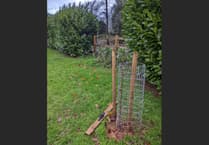I HAVE been thinking about disruption lately, and it being Easter week, there’s one story of disruption at the forefront of my mind.
About 2,000 years ago, Jesus rode into Jerusalem as a crowd waved palm leaves – a sign of victory – all around.
They were rejoicing in this man who chose to be with them, not over them; who chose a slow entrance on a borrowed donkey over a conquering display with horse and sword.
The world told people – and still does – that qualities like power, influence, distrust, ruthlessness and wealth were essential for leaders looking to inspire respect and take control. But the status quo did not serve people then, and it doesn’t serve them now.
Jesus walked around the land, sharing meals with people, loving the outcast and downtrodden. He never asked to be held aloft; He wanted to walk alongside.
In the week before His crucifixion, Jesus overturned trade tables in the temple, He washed the feet of His disciples, and He prayed in a garden that He might be released of His burden.
In these actions, He disrupted finance and religion in order to point to what really matters, He became a servant, and He became vulnerable. Everything He did disrupted the status quo.
Everything He did was not what people expected of a leader. And in this disruption, His main ask of us was simple and uncomfortable: love.
What if our leaders today took that ask seriously?
And what would this mean for the people being pushed into poverty right now because of the shameful storm of crises around us – the cost of living, energy, and climate crises?
What if our leaders rejected a grand entrance and borrowed a donkey to get to their work instead? And love and disruption are not just for Gods and leaders – they are things we can all use.
Recently, Mid Devon District Council held its “State of the District Debate”. The subject was climate change. Despite offering to help, and to input my experience on the topic, I was told by the leader that “it was well in-hand”.
So I attended the event like others did, not knowing what to expect. I was disappointed that only 51 people attended, 25 of whom were members of the public (despite an incorrect press release that went out after the event saying 75 had gone; corrected after I pointed it out).
Time was given to allow the portfolio holder to sum up the good work they’d done – much of which I had initiated or done when I was in that position (e.g. decarbonising leisure centres and creating a dedicated Council sustainability website to better share info and resources). But I have come to learn that credit is more often taken than given.
The State of the District Debate felt like a missed opportunity – people told me afterwards that they didn’t know it was happening, despite hours of officer and external speaker time having gone into it (officers’ organisation, and the speakers, were great).
Talks were about what individuals could do, but little time was given to what the Council with its influence and connections could do. The latest IPCC climate report makes clear that individual choices alone are important but make only a modest contribution to emission reductions.
Individual and collective action is made possible by things like better planning and building standards, better vehicle efficiency, and low carbon infrastructure – things that Councils are well placed to act on, or to influence.
To make these things reality, we need brave political change, locally and nationally, not primarily consumer behaviours. Sadly, our reckless government talks of abandoning our “phobia of hydrocarbons” and opening up new North Sea oil and gas drilling.
It can take decades for a new oil field to open; it won’t solve the energy crisis, the cost of living crisis, or the climate crisis. It’s a sorry excuse to protect fossil fuel interests. This is not brave leadership; it’s the government failing its duty to keep its citizens safe. It is the same kind of leadership Jesus protested against.
I am told by some Councillors that people don’t care about participating in Council plans and meetings; that they don’t want to engage. But I know that’s not true, because I have met hundreds of people who care deeply, and who are making change.
I think the reason people don’t attend Council events is because of other things -- poor publicity; inflexible Council processes; Councillors’ fear of ‘losing control’ of a conversation; a lack of real interest in the topic at the top of the hierarchy.
And that’s where we all come in. We can all get curious, challenge our leaders and media, and disrupt a damaging status quo if it means our communities and world – and especially the most marginalised – can be better served.
This Easter, alongside chocolate and holidays, celebration and tradition, I wonder if we might find time to think about the status quo that maintains inequality, and climate breakdown, and poverty, and look to Jesus for ideas on how to disrupt it.
He challenged authorities, challenged the processes that created them, challenged the priorities of the world. And more often than the temple table-overturning anger, His deep sense of justice was lived out through love.
So when we feel frustration at the status quo, are there opportunities to love into it, as well as change it?
That’s made possible in relationship, in real conversation, in honesty. And ironically, I don’t think Councils and many other public-serving bodies are very good at real conversation. Meetings can feel scripted and stifled. But Councils are vitally important and at their best, are vessels for such good.
This Easter, I am reminded of new life, possibility, love and justice, and am imagining public life where these things are taken seriously.
Cllr Elizabeth Lloyd (née Wainwright)
Sandford and Creedy Ward
Mid Devon District Council




.jpeg?width=209&height=140&crop=209:145,smart&quality=75)
Comments
This article has no comments yet. Be the first to leave a comment.